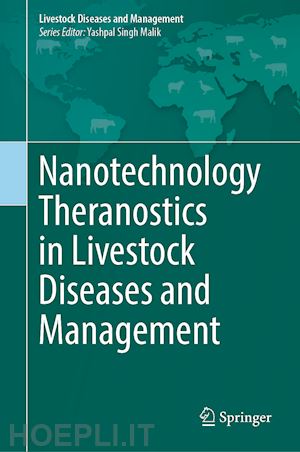

Questo prodotto usufruisce delle SPEDIZIONI GRATIS
selezionando l'opzione Corriere Veloce in fase di ordine.
Pagabile anche con Carta della cultura giovani e del merito, 18App Bonus Cultura e Carta del Docente
This book reviews various applications of nanotechnology in the prophylactic, diagnostic, and therapeutic management of livestock diseases. The initial section discusses the strategies for the synthesis of nanomaterials and characterization of different nanomaterials. The subsequent chapters explore the role of nanoparticles in the diagnosis of diseases caused by pathogenic microorganisms, including bacteria, viruses, protozoans, and fungi. The book also examines the nano sensors that are used for point-of-care diagnosis of various livestock diseases.
Additionally, it highlights nanoparticles-based vaccines and vaccine delivery systems to combat bacterial livestock diseases. Lastly, the book entails the strategies for developing nanotherapeutics for the treatment of bacterial, viral, fungal diseases, metabolic disorders, and cancer in livestock animals. The content of this book is useful for researchers and practitioners interested in understanding the applications of nanotechnology in diagnostics and therapeutics of livestock diseases.Dr. Minakshi has been professor & Head in the Department of Animal Biotechnology, LLR University of Veterinary and Animal Sciences (LUVAS), and currently working as ICAR-Scientist E in National Research Centre on Equines, Hisar, India. Her research interest is in bioinformatics and biotechnology with specialization in viruses; molecular characterization, diagnosis and vaccine design, study of genome analysis and diversity among viruses. She has been conferred with various prestigious awards notably, International Lifetime Achievement Award 2019 by PISRF(I) in Thailand, International Research Ratna Award, Malaysia. She has more than 30 years of teaching and research experience in microbiology and biotechnology, molecular diagnosis, forensics, vaccinology, comparative genomics, bioinformatics. She has also published more than 160 research articles in the peer-reviewed international journals and authored or co-authored books and book chapters. She is serving as Editor-in-Chief in Indian Journal of Microbiology (Springer). She is a Fellow and member of many international scientific societies and organizations importantly, the National Academy of Agricultural Sciences, India; the National Academy of Veterinary Sciences, International Academy of Biosciences, UK.
Dr. Rajesh Kumar is working as scientist in the Department of Veterinary Physiology and Biochemistry, Lala Lajpat Rai University of Veterinary and Animal Sciences, Hisar, Haryana, India. Earlier, he was engaged as an assistant professor, Kerala Veterinary and Animal Science University, Kerala, India. His research interest is in reproductive physiology, environmental physiology, proteomics and metabolomics, nanotechnology, antioxidant, and redox biology. Dr. Kumar has to his credit a patent for the development of diagnosis method of anestrous animals which have genetic linkage. He has been awarded with several prestigious fellowships and worked as referee for several prestigious International journals. He has authored or co-authored over 40 research articles in the peer-reviewed international journals, several books and book chapters. He is a member of different national and international scientific societies and organizations.
Dr. Mayukh Ghosh is an assistant professor in the Department of Veterinary Physiology and Biochemistry, RGSC, Banaras Hindu University, UP, India. His research interest is in proteomics and metabolomics, nanotechnology, reproduction, molecular parasitology, antioxidant and redox biology. He has authored or co-authored more than 30 research articles in the peer-reviewed international journals and several books and book chapters. He is a member of several national and international scientific societies and organizations.
Dr Shafiq Syed is currently a lecturer at the University of Newcastle. His research work is focused on defining the molecular pathwaysinvolved in the pathogenesis of gynecological cancers, for which he has developed several models including cancer patient-derived-xenograft and -organoid models, and genetically modified mouse-models of cancer progression and metastasis. He has published more than 30 research articles and book chapters. He is a member of the Hunter Cancer Research Alliance (HCRA) and Australian Society of Reproductive Biology.
Dr. Soumendu Chakravarti is a scientist (Sr. Scale) in ICAR-Indian Veterinary Research Institute, Izatnagar, India and has more than 12 years of research and teaching experience in molecular virology. He has been awarded ICAR International Fellowship and is currently on deputation as a visiting scientist, The Pirbright Institute, UK. He is currently working on a project to identify host-restriction factors mediated by Interferon-stimulated genes (ISGs) in virus infections and factors governing species-specific host restriction against viral diseases at the Pirbright Institute. He has published more than 50 research and review articles in peer-reviewed journals. He is a reviewer of several peer reviewed journals and is Life member of several scientific societies such as Society of General Microbiology (UK), Indian Science Congress Association, Indian Society for Veterinary Immunology and Biotechnology, Veterinary Council of India.











Il sito utilizza cookie ed altri strumenti di tracciamento che raccolgono informazioni dal dispositivo dell’utente. Oltre ai cookie tecnici ed analitici aggregati, strettamente necessari per il funzionamento di questo sito web, previo consenso dell’utente possono essere installati cookie di profilazione e marketing e cookie dei social media. Cliccando su “Accetto tutti i cookie” saranno attivate tutte le categorie di cookie. Per accettare solo deterninate categorie di cookie, cliccare invece su “Impostazioni cookie”. Chiudendo il banner o continuando a navigare saranno installati solo cookie tecnici. Per maggiori dettagli, consultare la Cookie Policy.